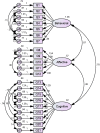Perceptions of Medical Students on Distance Learning During the COVID-19 Pandemic: A Cross-Sectional Study from Bahrain
- PMID: 35478974
- PMCID: PMC9037435
- DOI: 10.2147/AMEP.S357335
Perceptions of Medical Students on Distance Learning During the COVID-19 Pandemic: A Cross-Sectional Study from Bahrain
Abstract
Purpose: The COVID-19 pandemic resulted in a sudden shift from face-to-face to distance learning. We explored medical students' views of online learning during this pandemic at the Arabian Gulf University in Bahrain.
Methods: This was a cross-sectional study of students in years two, three and four (n= 559) using an electronic questionnaire. Data were collected from April 10 to May 5, 2021. The survey included three domains: behavioral, affective, and cognitive. We also analyzed the association between students' perceptions and certain demographic and institutional factors.
Results: The number of respondents was 311 (response rate: 55.6%; 27.7% males, 72.3% females). Participants were generally satisfied with distance learning (54.6%), although they had less motivation (46.3%) and required more effort (32.2%). Most students preferred distance learning for theoretical parts, and face-to-face approach for practical components (73.3%). Participants reported that distance learning, improved interaction with instructors and classmates (45.6% and 48.9%, respectively), small group learning (47.6%), independent learning (75.3%) and problem-solving skills (44.7%). The students were comfortable with online assessment (60.1%), and reported improved achievement in written (42.1%) and practical examinations (46%), but not in professional skills grades (21.6%). There was no association between students' perceptions and gender (p= 0.079), year of study (p= 0.28) or attendance of live or recorded sessions (p= 0.904), but there was a positive association with the availability of WiFi (p< 0.01) and attendance of college-organized activities (p< 0.0001).
Conclusion: Distance learning was successfully implemented during the COVID-19 pandemic. Students were generally satisfied with distance learning and online assessment, but they had concerns about the clinical skills learning. After the pandemic is over, theoretical components of the curriculum can be delivered using distance learning, whereas hands on elements should be offered face-to-face. However, those curricular reforms will likely need investing in the information technology infrastructure.
Keywords: COVID-19; distance learning; medical students; perceptions.
© 2022 Tayem et al.
Conflict of interest statement
The authors report no conflicts of interest pertinent to this work.
Figures
References
-
- Amer J, Yasin I, Alya H. The impact of educational videos on medical students’ learning. AGJSR. 2020. Available from: https://agjsr.agu.edu.bh/uploads/images/papers/pdfs/10cec25db09ffc763a36....
LinkOut - more resources
Full Text Sources
Miscellaneous


